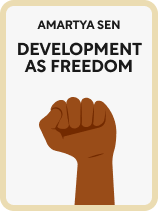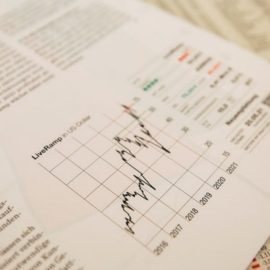

This article is an excerpt from the Shortform book guide to "Development as Freedom" by Amartya Sen. Shortform has the world's best summaries and analyses of books you should be reading.
Like this article? Sign up for a free trial here .
Why are free markets important for a nation’s economic development? What are the advantages of free-market systems?
Not only do free markets protect the rights of individuals, but they also have lifted people out of poverty. In Development as Freedom, Amartya Sen argues that a free market is a way for a nation to experience economic prosperity.
Here are the advantages of free markets that Sen highlights and how they compare to a utilitarian market.
The Advantages of Free Markets
Markets are integral to Sen’s theory of development because they afford basic freedoms and spur economic growth. Sen argues that markets have both intrinsic and instrumental value, but also shortcomings.
Sen identifies two advantages of free markets that are integral to his view of development:
1. As a means to economic growth and progress: Sen acknowledges that free markets can increase economic growth and overall economic progress. However, Sen says free markets are much more than just a means to improve prosperity.
2. As a fundamental freedom that people have reason to value: Independent of its impact on economic growth, the freedom to exchange goods and services is a basic part of social interaction and is valuable as its own kind of freedom.
Nonetheless, Sen takes care to enter into his calculus the aspects of free markets, such as income and gender inequality, that may contribute to the systematic exclusion of some marginalized groups. He also favors government intervention like social support and regulation when they can improve overall welfare.
Adam Smith on the Role of the Market
Sen relies heavily on the work of Adam Smith to support his philosophical and practical case for freedom. Some scholars call this Adam Smith’s “presumption of liberty.”
Smith generally thought that an undisturbed market was the best engine for progress and liberty. However, he did acknowledge that there are circumstances when the market fails to provide socially preferable results. In such cases, he believed it was just to prioritize the public good. He specifically mentioned the government’s role in national defense, in enforcing the rule of law, and in providing public works like roads and bridges. Smith also advocated imposing restrictions on the levels of interest rates banks can charge, although many economists disagree with his reasoning.
In Development as Freedom, Sen follows a similar line of reasoning. He views freedom as important and useful to the public good but identifies some areas where the government can improve general welfare.
Markets and Freedom
Sen notes that the liberal, “laissez-faire” bent of classical economists like Adam Smith and David Ricardo was first and foremost about freedom, and only secondarily about the efficiency of markets.
However, in modern economics, there’s been a shift away from a freedom-focused defense of markets toward a utilitarian one, which focuses on doing the greatest good for the most people.
The utilitarian approach focuses on results—however, Sen advocates focusing equally on results and process. By “process” Sen refers to a person’s ability to exercise freedom. He presents two examples to show why thinking about markets in this way addresses well-being to a greater extent than does the utilitarian approach.
Example #1
One advantage of a free market is its process. Sen offers a hypothetical to show the importance of process: Consider two economies, one that is decentralized, with resources allocated by market mechanisms; the other, a centrally planned economy in which resources are allocated by the decisions of a dictator.
If both economies achieve the same economic results, despite their differing processes, both are equally valid from a utilitarian perspective. However, in Sen’s view, the market economy would clearly be superior because of its process—allowing people the freedom to make economic choices enhances individual and societal well-being. In contrast, the centralized economy’s process inflicts a social cost.
Example #2
Another advantage of free markets demonstrates why it’s necessary to focus on process as well as results by comparing forced labor and free labor.
Sen cites empirical evidence showing that the compensation of American slaves (measured in terms of the goods they consumed) was similar to that of free laborers. Additionally, American slaves had life expectancies that were higher than those of industrial workers in the United States, and on par with the nations of France and Holland.
From a utilitarian perspective, focusing only on the outcomes of compensation and life expectancy, forced labor has a higher utility than free labor and is therefore the better option. But, this utilitarian perspective, which analyzes only the results of slavery, overlooks entirely its deprivation of freedom, which every person has reason to value.
By emphasizing its processes, the true cost of forced labor—whether slavery or other forms of bondage—can be fully considered.

———End of Preview———
Like what you just read? Read the rest of the world's best book summary and analysis of Amartya Sen's "Development as Freedom" at Shortform .
Here's what you'll find in our full Development as Freedom summary :
- The five types of freedom that are integral to economic development
- How democracy can prevent famine
- How empowering women helps communities






